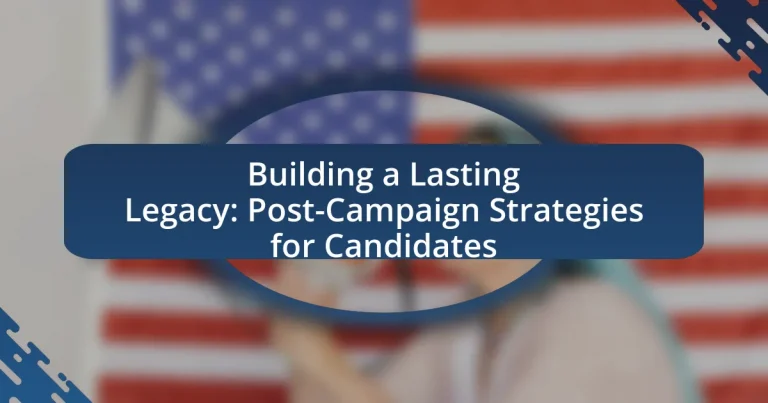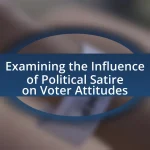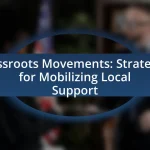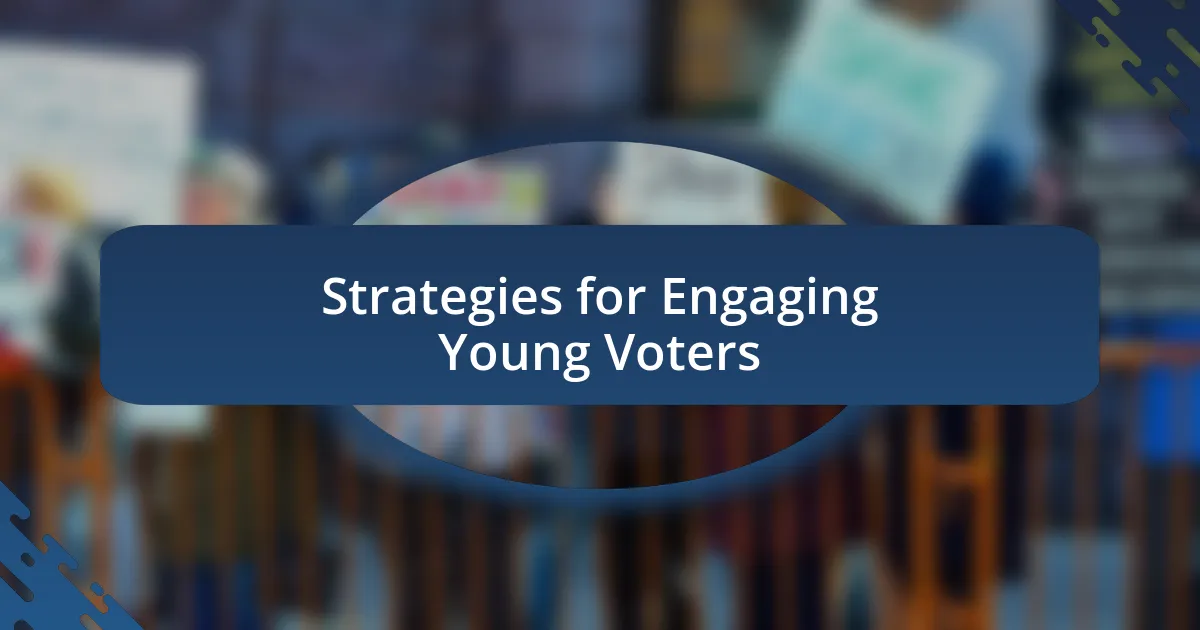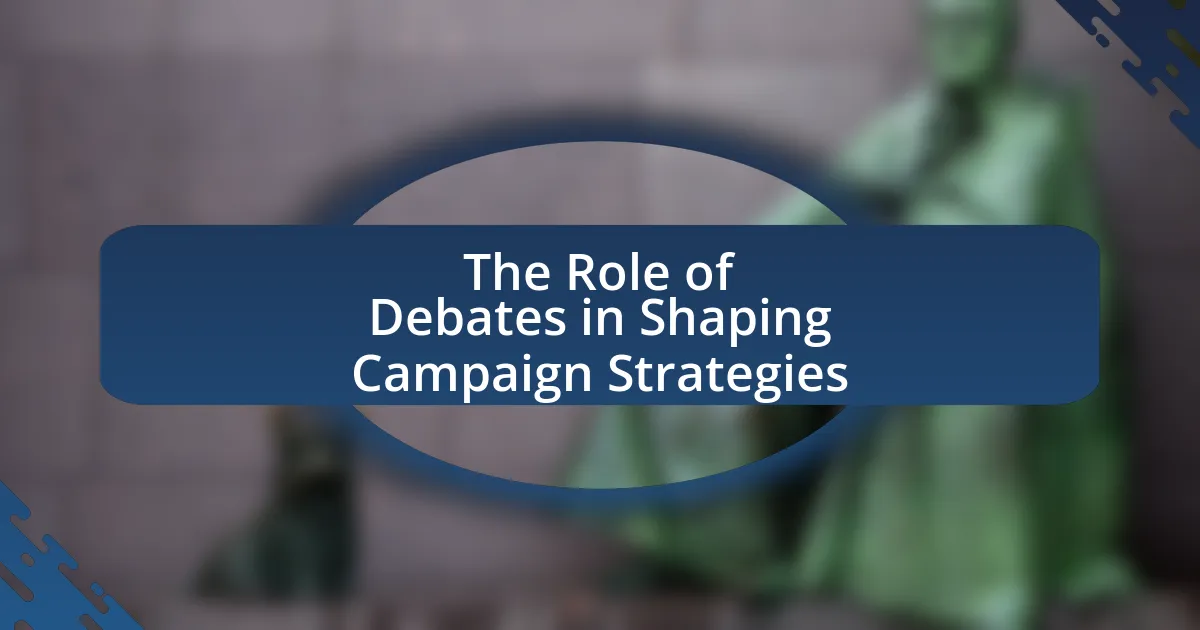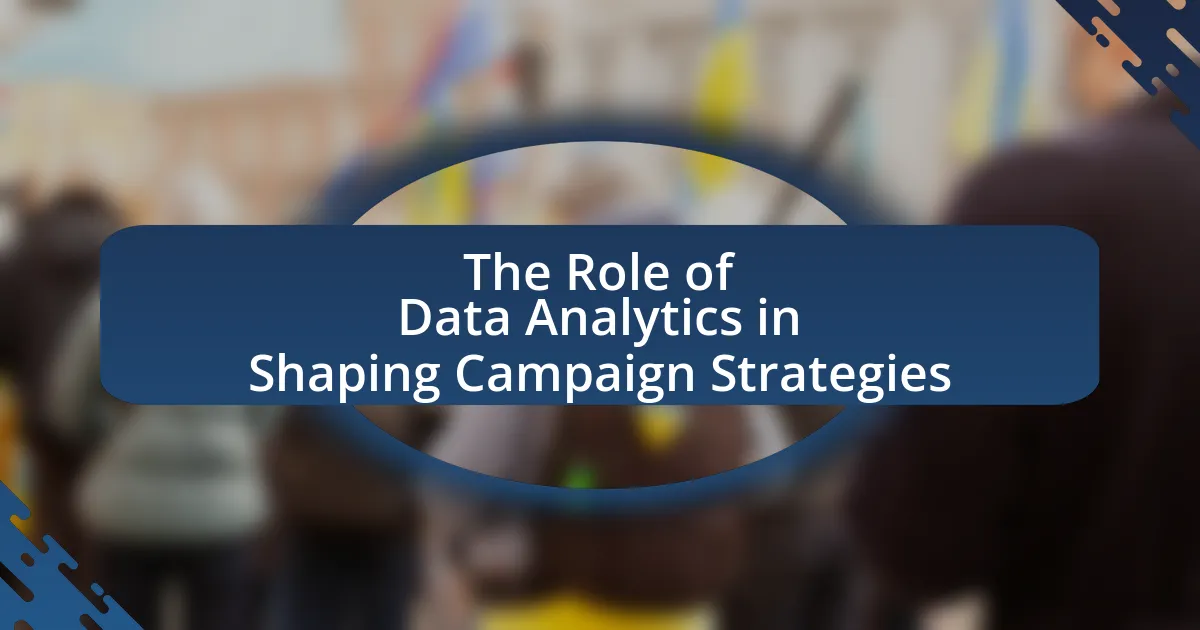The article focuses on post-campaign strategies for candidates aiming to build a lasting legacy in the political landscape. It outlines the importance of maintaining engagement with supporters, evaluating campaign performance, and leveraging established networks for future opportunities. Key components discussed include effective communication, community involvement, and the establishment of a clear vision. The article emphasizes the role of public perception and relationship building in enhancing a candidate’s credibility and influence, while also addressing common pitfalls to avoid in post-campaign efforts. Overall, it provides practical tips for candidates to ensure their legacy endures beyond their election campaigns.
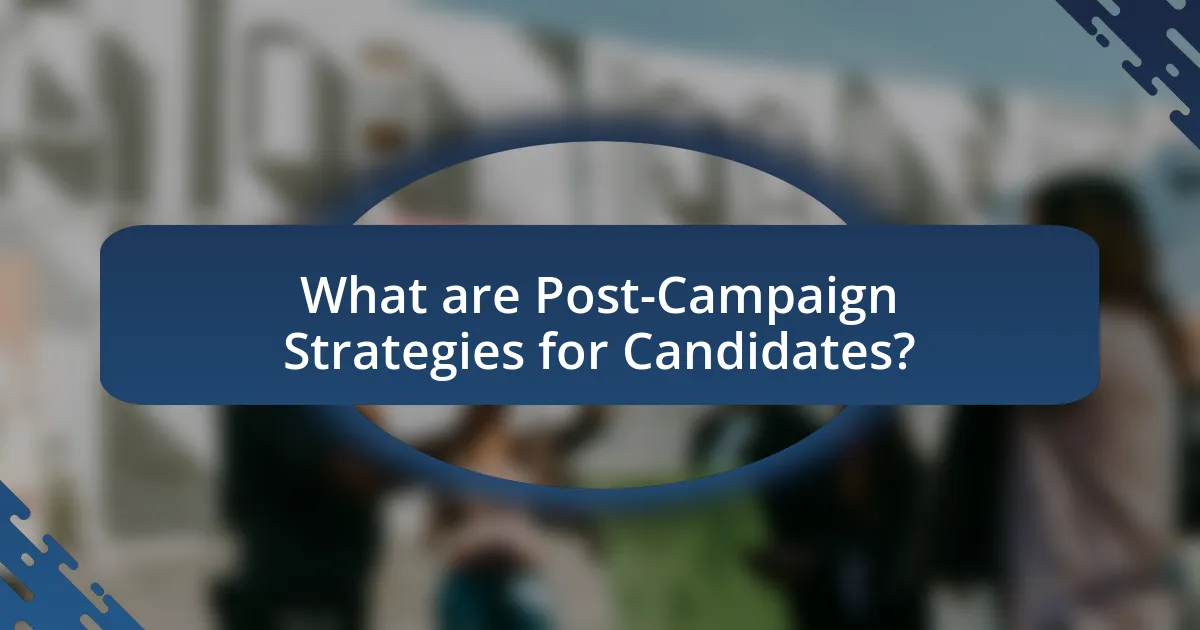
What are Post-Campaign Strategies for Candidates?
Post-campaign strategies for candidates include maintaining engagement with supporters, evaluating campaign performance, and leveraging the campaign’s network for future opportunities. Candidates should actively communicate with their base through newsletters and social media to keep supporters informed and involved. Evaluating campaign performance involves analyzing voter data and feedback to identify strengths and weaknesses, which can inform future strategies. Additionally, candidates can utilize their established networks for endorsements, fundraising, or collaboration on community initiatives, thereby enhancing their political capital and influence. These strategies are essential for candidates aiming to build a lasting legacy and remain relevant in the political landscape.
Why are Post-Campaign Strategies important for building a lasting legacy?
Post-campaign strategies are crucial for building a lasting legacy because they ensure continued engagement and influence beyond the election period. These strategies allow candidates to maintain relationships with supporters, leverage their platform for ongoing advocacy, and foster community involvement, which can solidify their impact and relevance in the political landscape. For instance, successful post-campaign initiatives, such as establishing foundations or advocacy groups, can lead to sustained efforts on key issues, thereby enhancing a candidate’s legacy and demonstrating commitment to their constituents.
How do these strategies influence a candidate’s future opportunities?
Post-campaign strategies significantly enhance a candidate’s future opportunities by establishing a strong personal brand and network. These strategies, such as community engagement and ongoing communication with supporters, create lasting relationships that can lead to endorsements, job offers, or future political opportunities. For instance, candidates who maintain visibility and actively participate in local events often find themselves in positions of influence, as demonstrated by numerous politicians who transitioned into successful roles after their campaigns by leveraging their established connections and reputation.
What role does public perception play in these strategies?
Public perception significantly influences post-campaign strategies for candidates by shaping their public image and guiding their future actions. Candidates must align their strategies with the prevailing public sentiment to maintain support and credibility. For instance, a study by the Pew Research Center indicates that 70% of voters consider a candidate’s reputation when deciding on future endorsements or political support. This demonstrates that positive public perception can enhance a candidate’s ability to mobilize resources and engage with constituents effectively. Therefore, managing public perception is crucial for candidates aiming to build a lasting legacy after their campaigns.
What are the key components of effective Post-Campaign Strategies?
The key components of effective post-campaign strategies include evaluation, engagement, and relationship building. Evaluation involves analyzing campaign performance metrics to understand what worked and what didn’t, allowing candidates to refine future strategies. Engagement focuses on maintaining communication with supporters and constituents through newsletters, social media, and community events, ensuring ongoing connection and support. Relationship building emphasizes fostering connections with key stakeholders, including donors, volunteers, and local organizations, to create a network that can support future initiatives. These components are essential for candidates to leverage their campaign momentum and establish a lasting impact in their communities.
How can candidates leverage their campaign networks after the election?
Candidates can leverage their campaign networks after the election by maintaining communication and engagement with supporters, volunteers, and donors. This ongoing interaction can facilitate collaboration on community initiatives, advocacy efforts, or future political endeavors. For instance, successful candidates often utilize their networks to mobilize support for local issues, thereby reinforcing their presence and influence in the community. Historical examples include former President Barack Obama, who effectively used his campaign network to establish the Organizing for Action group, which continued to advocate for progressive policies post-election. This demonstrates that a well-maintained network can serve as a powerful tool for sustained political engagement and influence.
What communication strategies should candidates adopt post-campaign?
Candidates should adopt transparent and consistent communication strategies post-campaign to maintain public trust and engagement. This involves regularly updating constituents on policy developments, responding to community concerns, and utilizing multiple platforms, such as social media and newsletters, to reach diverse audiences. Research indicates that consistent communication fosters a sense of connection and accountability, which is crucial for building a lasting legacy. For instance, a study by the Pew Research Center found that 69% of Americans believe that elected officials should keep their constituents informed about their work.
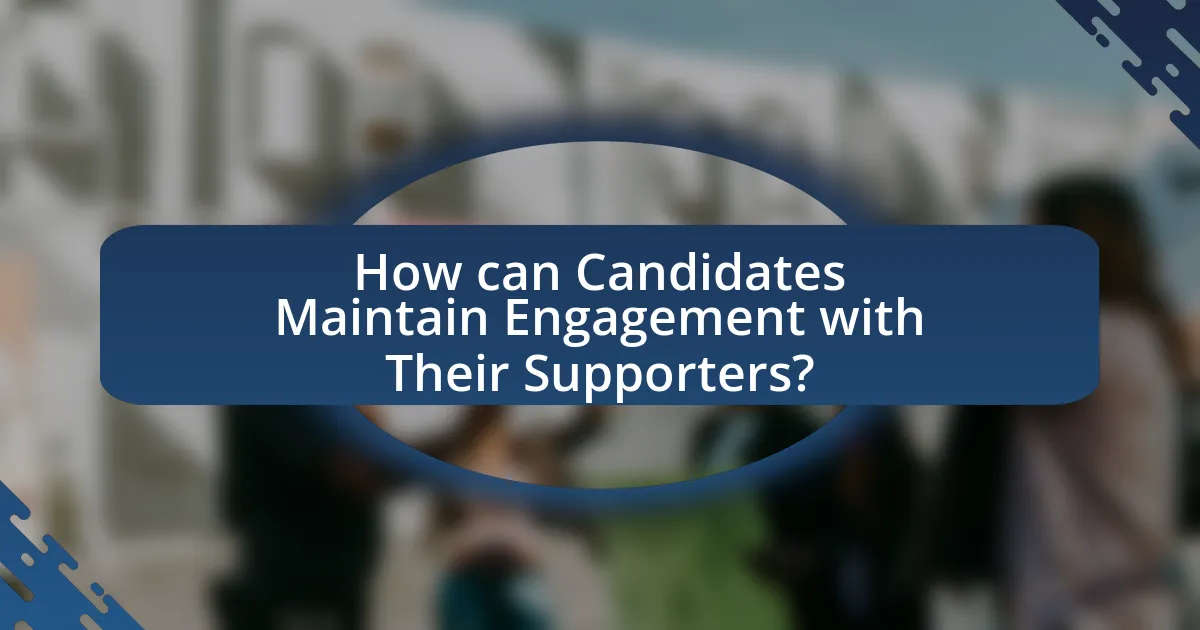
How can Candidates Maintain Engagement with Their Supporters?
Candidates can maintain engagement with their supporters by utilizing consistent communication through various channels such as social media, newsletters, and community events. This approach allows candidates to keep their supporters informed about ongoing initiatives and to solicit feedback, fostering a sense of community and involvement. Research indicates that candidates who engage with their supporters regularly are more likely to sustain loyalty and support, as evidenced by a study from the Pew Research Center, which found that 69% of voters appreciate ongoing communication from candidates even after elections.
What methods can candidates use to keep their supporters informed?
Candidates can keep their supporters informed through regular communication channels such as newsletters, social media updates, and community events. These methods allow candidates to share important updates, policy changes, and upcoming initiatives directly with their supporters. For instance, utilizing email newsletters can provide detailed information and foster a sense of community among supporters, while social media platforms enable real-time engagement and feedback. Additionally, hosting community events allows for face-to-face interaction, reinforcing relationships and ensuring that supporters feel valued and informed.
How can social media be utilized for ongoing engagement?
Social media can be utilized for ongoing engagement by creating consistent, interactive content that encourages audience participation. Candidates can share updates, respond to comments, and host live Q&A sessions to maintain a dialogue with their supporters. Research indicates that 70% of consumers feel more connected to brands with which they can interact on social media, highlighting the importance of engagement in building relationships. By leveraging features such as polls, stories, and user-generated content, candidates can foster a sense of community and keep their audience invested in their ongoing initiatives.
What types of events can candidates host to foster community involvement?
Candidates can host community forums, volunteer days, and cultural events to foster community involvement. Community forums allow candidates to engage directly with residents, addressing concerns and gathering feedback, which strengthens community ties. Volunteer days encourage residents to participate in local service projects, promoting teamwork and civic responsibility. Cultural events, such as festivals or art shows, celebrate local heritage and diversity, enhancing community pride and connection. These types of events have been shown to increase civic engagement and build lasting relationships between candidates and constituents.
Why is it essential for candidates to establish a clear vision post-campaign?
It is essential for candidates to establish a clear vision post-campaign to maintain momentum and guide their future actions. A defined vision helps candidates articulate their goals and priorities, ensuring that their supporters remain engaged and focused on a common purpose. For instance, candidates who outline specific objectives can effectively mobilize resources and build coalitions, as seen in successful political movements where clear post-campaign strategies led to sustained advocacy and policy changes. This clarity not only reinforces the candidate’s commitment to their constituents but also enhances their credibility and influence in the political landscape.
How does a clear vision impact a candidate’s credibility?
A clear vision significantly enhances a candidate’s credibility by demonstrating their ability to articulate goals and strategies effectively. When candidates present a well-defined vision, it instills confidence in voters and stakeholders, as it reflects their understanding of issues and their commitment to addressing them. Research indicates that candidates with a clear vision are perceived as more trustworthy and competent; for instance, a study by the Pew Research Center found that 70% of voters prioritize a candidate’s vision for the future when making electoral decisions. This perception of clarity and direction fosters a stronger connection with the electorate, ultimately reinforcing the candidate’s credibility.
What steps can candidates take to articulate their vision effectively?
Candidates can articulate their vision effectively by clearly defining their core values and objectives. This involves creating a concise and compelling narrative that resonates with their audience, ensuring that the message is relatable and easy to understand. Candidates should also utilize storytelling techniques to illustrate their vision, making it more engaging and memorable. Additionally, they can reinforce their vision through consistent communication across various platforms, including speeches, social media, and community events. Research indicates that effective communication of vision can significantly enhance public perception and support, as seen in successful campaigns where candidates maintained a clear and consistent message throughout their tenure.
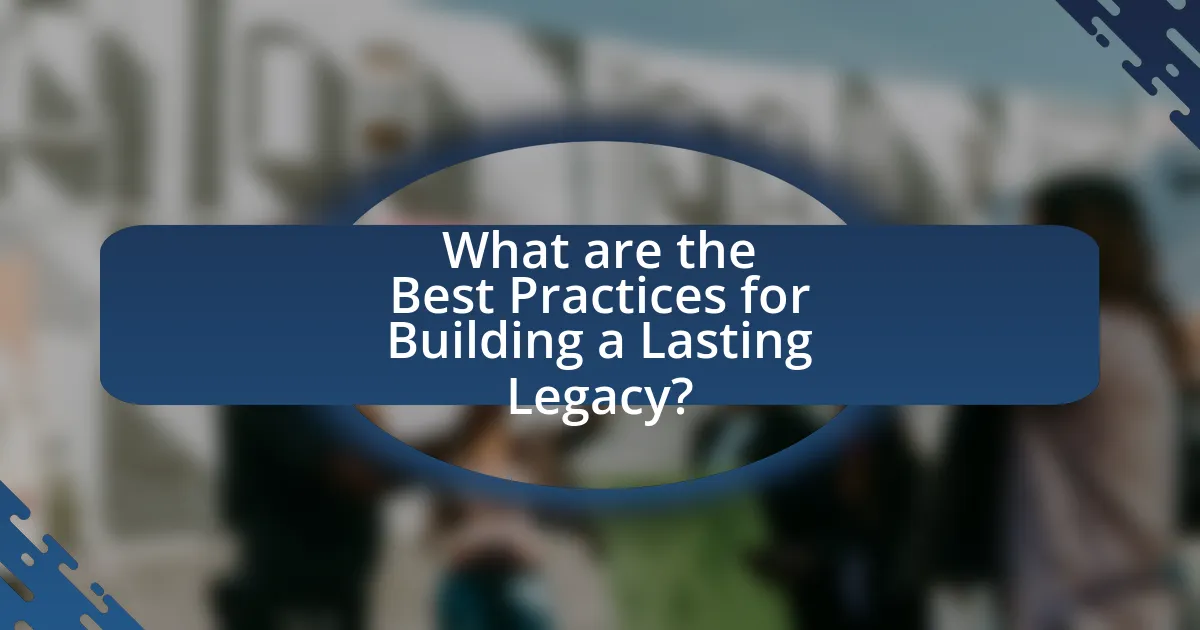
What are the Best Practices for Building a Lasting Legacy?
The best practices for building a lasting legacy include establishing clear values, engaging in community service, and fostering mentorship. Establishing clear values ensures that actions align with a candidate’s principles, which can resonate with constituents and create a strong foundation for future initiatives. Engaging in community service demonstrates commitment to societal improvement, as seen in historical figures like Nelson Mandela, whose community-focused efforts solidified his legacy. Fostering mentorship allows candidates to empower future leaders, ensuring that their influence continues beyond their tenure, similar to how former U.S. Presidents have mentored successors and emerging political figures. These practices collectively contribute to a meaningful and enduring legacy.
How can candidates create a sustainable impact in their communities?
Candidates can create a sustainable impact in their communities by actively engaging in local initiatives and fostering partnerships with community organizations. By collaborating with local stakeholders, candidates can identify pressing issues and develop targeted solutions that address the needs of their constituents. For instance, research from the National Civic League indicates that community engagement leads to improved public trust and better outcomes in local governance. Furthermore, candidates can implement programs focused on education, health, and economic development, which have been shown to create long-term benefits for community resilience and growth.
What initiatives can candidates champion to align with their values?
Candidates can champion initiatives such as environmental sustainability, social justice, and community engagement to align with their values. For instance, advocating for renewable energy policies demonstrates a commitment to combating climate change, which is supported by data indicating that transitioning to renewable sources can reduce greenhouse gas emissions significantly. Additionally, promoting equitable access to education and healthcare reflects a dedication to social justice, as studies show that these factors are crucial for community well-being and economic stability. Engaging in local volunteer efforts or supporting grassroots organizations can further solidify a candidate’s connection to their community, fostering trust and demonstrating a genuine commitment to the values they espouse.
How can collaboration with local organizations enhance their legacy?
Collaboration with local organizations can enhance a candidate’s legacy by fostering community engagement and creating lasting partnerships that address local needs. When candidates work with local organizations, they demonstrate a commitment to the community, which can lead to increased trust and support among constituents. For example, a study by the National League of Cities found that local partnerships can improve civic participation and strengthen community ties, ultimately contributing to a candidate’s positive reputation and legacy. By aligning their goals with those of local organizations, candidates can leave a meaningful impact that resonates beyond their campaign, solidifying their legacy in the community.
What common pitfalls should candidates avoid in their post-campaign efforts?
Candidates should avoid neglecting their supporters in post-campaign efforts. Failing to engage with the individuals who contributed to the campaign can lead to a loss of trust and support for future endeavors. Additionally, candidates should refrain from making abrupt changes to their messaging or policy positions, as this can alienate their base and create confusion about their commitment to the issues they championed during the campaign. Lastly, candidates must avoid overlooking the importance of transparency in their actions and decisions post-campaign; a lack of transparency can result in skepticism and diminish their credibility. These pitfalls are critical to recognize, as maintaining a strong relationship with supporters and ensuring consistent messaging are essential for building a lasting legacy.
How can candidates ensure they do not alienate their supporters?
Candidates can ensure they do not alienate their supporters by actively engaging with them and addressing their concerns. Regular communication through town halls, social media, and newsletters fosters a sense of inclusion and transparency. For instance, a study by the Pew Research Center found that 70% of voters appreciate candidates who listen to their opinions and feedback. By prioritizing dialogue and demonstrating responsiveness to supporters’ needs, candidates can maintain strong relationships and avoid feelings of neglect or betrayal among their base.
What mistakes can undermine a candidate’s legacy?
Mistakes that can undermine a candidate’s legacy include failing to maintain transparency, engaging in unethical behavior, and neglecting to address constituents’ needs. Transparency is crucial; for instance, when candidates hide financial information or make misleading statements, they erode public trust, as seen in the cases of various political scandals. Unethical behavior, such as accepting bribes or engaging in corruption, can lead to a tarnished reputation and loss of support, exemplified by historical figures like Richard Nixon. Additionally, ignoring the concerns of constituents can result in a disconnect from the electorate, diminishing a candidate’s impact and legacy, as evidenced by politicians who lose favor due to inaction on pressing issues.
What practical tips can candidates follow to ensure their legacy endures?
Candidates can ensure their legacy endures by actively engaging with their communities and maintaining transparency in their actions. Engaging with the community fosters trust and strengthens relationships, which are essential for a lasting impact. For instance, former President Barack Obama established the Obama Foundation to continue his work in community engagement and leadership development, demonstrating how ongoing involvement can enhance a candidate’s legacy. Additionally, maintaining transparency through regular communication and accountability helps build credibility, as seen in the practices of various political leaders who share their decision-making processes and outcomes with the public. These strategies collectively contribute to a legacy that resonates beyond a candidate’s term in office.
